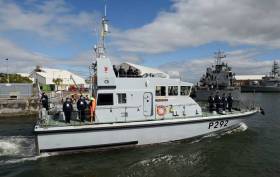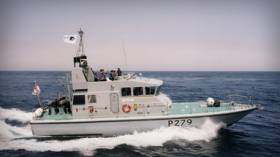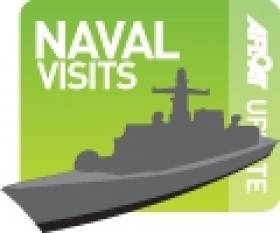Displaying items by tag: Archer P2000 class
University Challenge As UK’s Royal Navy Boat Squadron On Tour
#NavalVisits - At this stage of the UK’s Royal Navy University Boat Squadron tour the last visit was to Kinsale Harbour and followed calls to Cork, Waterford and Dublin, where the flotilla is to return for the Easter Weekend, writes Jehan Ashmore.
Afloat has been monitoring movements of the naval flotilla of Archer P2000 class inshore patrol boats that visited Dublin Port last week at the Poolbeg Yacht & Boat Club Marina. The patrol trio comprise of HMS Biter, Charger and Persuer which are part of the First Patrol Boat Squadron, whose primary role is to support the University Royal Naval Units (URNU).
The White Ensign flagged visitors had berthed in Kinsale Yacht Club Marina where they arrived this week until departing last night. Also in port was and remains today the Musketier, a Manx flagged Peel registered cargoship that is operated from an East Cowes, Isle of Wight based company, Faversham Ships.
Prior to the call to Kinsale Harbour, a courtesy call was paid to the Irish Naval Service base in Cork Harbour where the P2000's berthed within the naval dock basin. Upon arrival, four Naval Service patrol vessels were berthed. A pair of Babcock built OPV’s from their shipyard in Appledore, Devon, flagship HPV LÉ Eithne built locally in Rushbrooke and CPV LÉ Orla, the former RN HMS Swift launched in Aberdeen and which formed part of the Hong Kong Patrol Squadron.
Since Sunday, members of the URNU travelled from Dublin to Waterford and this was followed in Cork Harbour where they met with Commodore Michael Malone Flag Officer Commanding Naval Service. Another recent naval visitor albeit to Cork City quays was the Belgium Navy’s BNS Castor, a patrol vessel where relationships with the city and nation were strengthened.
In total 14 craft from the RN’s Archer P2000 class are assigned to the UNRUs though they also contribute to a wide range of fleet tasking. A RN Lieutenant commands each of the URNUs and is responsible for 51 undergraduates during their time in the Unit. The university squadron is not a recruiting organisation and membership of the URNU carries no obligation to join the Royal Navy on graduation.
Equally to the same number of P2000 craft, 14 units of the URNU are located around the UK offering opportunities to 700 undergraduates from the country’s leading universities in England, Scotland and Wales. An example been HMS Charger which has been the URNU for Liverpool University since 1990. The 54 tonnes craft is based at Brunswick Dock on the site of the new Royal Naval Headquarters on Merseyside.
The URNU aims to broaden a naval understanding and develop undergraduates who show potential through maritime experience and exposure to the values and ethos of the RN.
In addition they have opportunities to take part in sporting events, adventurous training activities and gain a CMI qualification all within a vibrant and friendly social scene.
Small Yet Fast Royal Navy Patrol Craft to Pay Visit
#FastPatrols -A pair of small yet high-speed Royal Navy Inshore Patrol Craft in which one served in Gibraltar are to pay a visit to Dublin Port,writes Jehan Ashmore.
The ‘Archer’ class HMS Blazer along with HMS Ranger are to arrive today. They belong to the 14 strong P2000 Fast Inshore Patrol Craft that form the First Patrol Boat Squadron.
Primary role of the P2000’s is to support the University Royal Naval Units (URNU) but they also contribute to a wide range of Fleet tasking. Among them fishery protection duties and safeguarding the integrity of the UK's territorial waters.
The craft provide training and maritime experience for University Royal Naval Unit students and also provide support to Fleet tasking and exercises.
HMS Blazer (P279) is the URNU at Southampton Solent University, Portsmouth University and Southampton Institute.
As for HMS Ranger, this sister is the URNU at Sussex University, however she served for 13 years in the Gibraltar Squadron before returning to the UK in 2004.
Some characteristics of the Archer P2000 craft are listed below.
Tonne Displacement: 54
Top Speed: 25 knots
Nautical Range: (550 miles)
Weapons: DS3OB 30mm Gun and GAM BO 20mm Gun
The visiting Royal Navy pair are to berth at Ocean Pier from where HMS Portland also called in recent years. The Type 23 Duke class frigate was referred to related naval news regards the recently decommissioned RFA Gold Rover.
Royal Navy Patrol Craft Dock In Dun Laoghaire Marina
#NavalVisits-A pair of Royal Navy 20m inshore fast patrol boats berthed yesterday in Dun Laoghaire Marina, having previously called to Cork Harbour over the Easter weekend, writes Jehan Ashmore.
HMS Express (P163) and HMS Exploit (P167) with a crew of five each, belong to a 14 strong fleet of Archer P2000 class and they form the First Patrol Boat Squadron. Both vessels are based in Penarth Marina, near Cardiff.
Their primary role is to support the University Royal Naval Units (URNU) but they also contribute to a wide range of fleet tasking. The URNU is based at HMS Cambria, a Royal Navy Reserve establishment near the Welsh capital.






























































